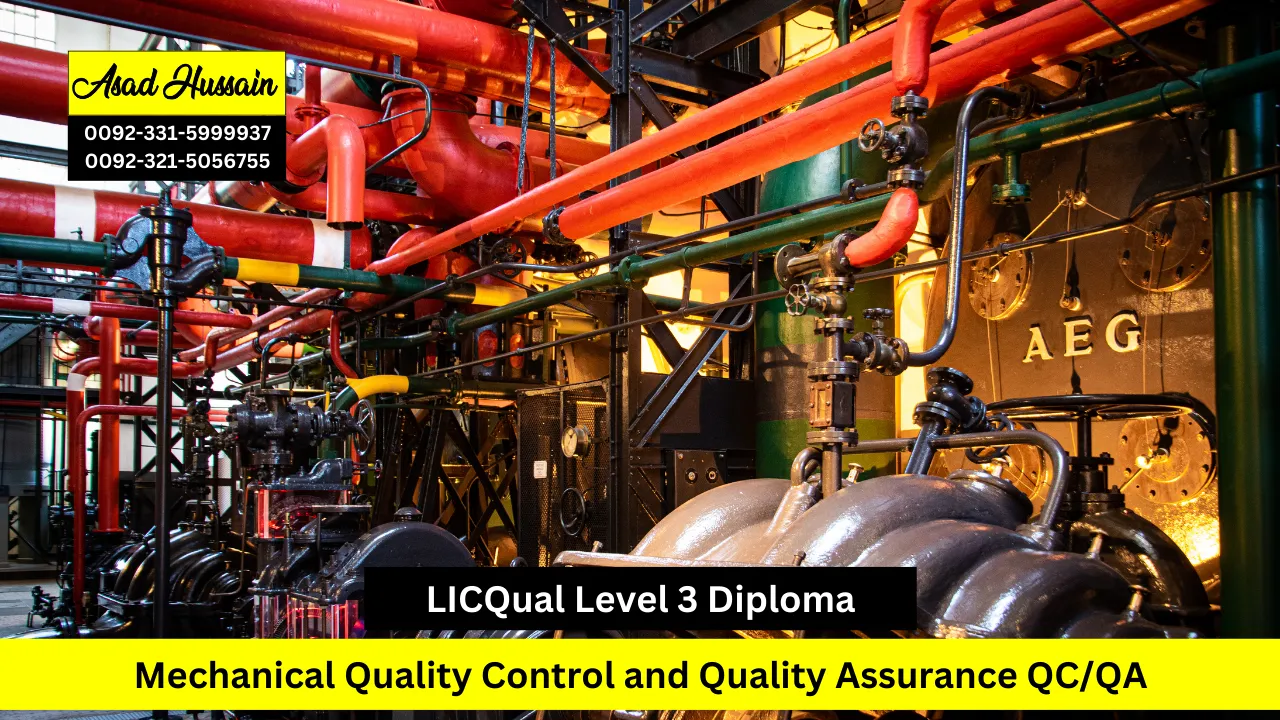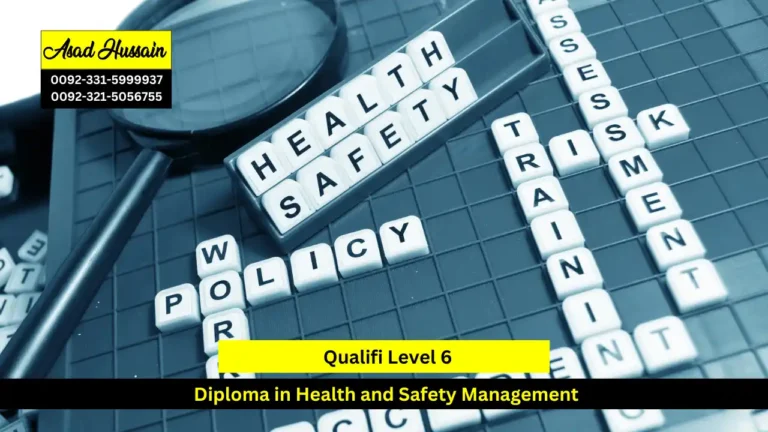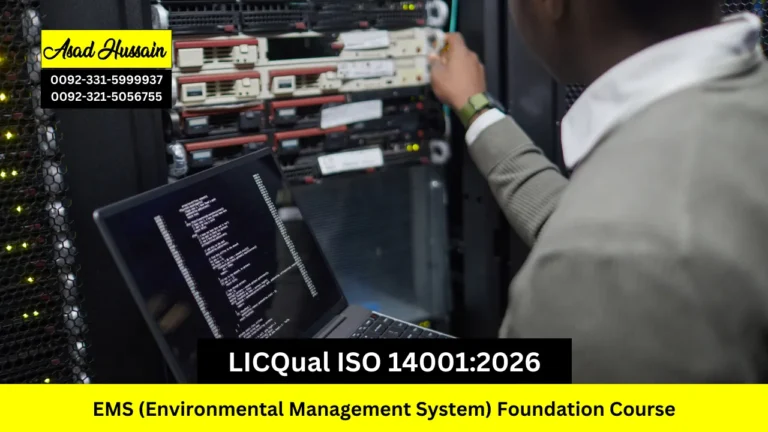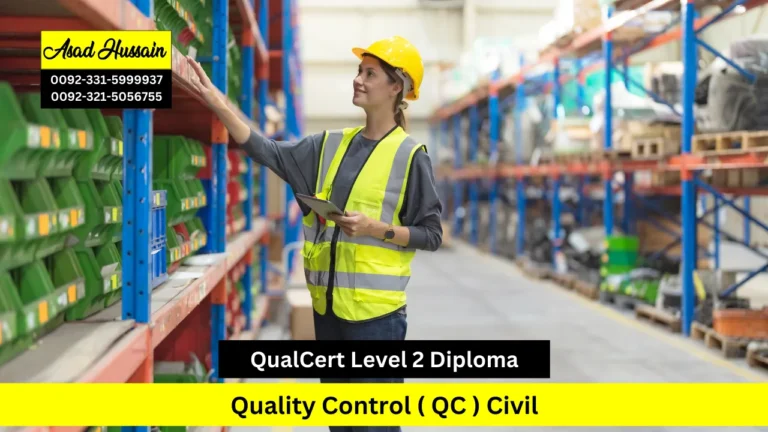The mechanical engineering and manufacturing industry demands strict adherence to quality standards, safety protocols, and regulatory compliance to ensure the reliability, efficiency, and safety of mechanical systems. The LICQual Level 3 Diploma in Mechanical Quality Control and Quality Assurance (QC/QA) is designed to equip professionals with the knowledge, skills, and practical expertise required to implement effective quality management practices across mechanical projects and operations.
LICQual level 3 Diploma in Mechanical Quality Control and Quality Assurance QC/QA provides a comprehensive understanding of mechanical quality control and assurance principles, including inspection techniques, compliance with industry standards, risk assessment, and quality documentation. Learners will gain hands-on experience in identifying mechanical defects, analyzing system performance, conducting quality inspections, and implementing corrective and preventative measures. The course emphasizes practical applications, enabling candidates to apply theoretical concepts directly to mechanical systems, manufacturing processes, and operational workflows.
By enrolling in LICQual level 3 Diploma in Mechanical Quality Control and Quality Assurance QC/QA, learners will develop critical skills in quality assessment, regulatory compliance, and risk mitigation, preparing them for roles such as QA/QC inspectors, mechanical engineers, maintenance supervisors, and quality assurance specialists. The course also fosters analytical thinking, problem-solving, and process improvement capabilities, ensuring graduates can contribute to enhanced operational efficiency and system reliability.
Upon completion, candidates will be equipped with the practical, technical, and professional competencies necessary to uphold the highest standards of mechanical quality assurance. LICQual level 3 Diploma in Mechanical Quality Control and Quality Assurance QC/QA prepares learners to ensure compliance with national and international standards, improve manufacturing and operational outcomes, and advance their careers in mechanical quality management, inspection, and assurance.
Program Highlights
Mandatory Units
- Fundamentals of Mechanical Quality Control
- Quality Assurance Systems and Standards
- Inspection Techniques and Tools
- Process Control and Optimization
- Non-Destructive Testing (NDT) Methods
- Documentation and Reporting for Quality Control
The LICQual Level 3 Diploma in Mechanical Quality Control and Quality Assurance (QC/QA) is designed for professionals seeking to enhance their expertise in mechanical engineering, quality management, and inspection processes. To ensure learners are fully prepared for the course, the following entry requirements apply:
1. Age Requirements
- Applicants must be at least 18 years old to enroll in the course.
2. Educational Requirements
- Minimum of a Level 2 qualification in Mechanical Engineering, Manufacturing, Industrial Technology, or a related technical field.
- Equivalent professional certifications or practical experience in mechanical engineering or QA/QC roles may also be considered.
3. Professional Experience
- Preferably 1–2 years of experience in mechanical engineering, manufacturing supervision, maintenance, or quality assurance roles.
- Exposure to compliance, safety standards, and process management is highly advantageous.
4. English Language Proficiency
- Non-native English speakers must provide evidence of proficiency, such as IELTS 5.5+ or equivalent, to ensure comprehension of course materials and assessments.
The LICQual Level 3 Diploma in Mechanical Quality Control and Quality Assurance (QC/QA) equips learners with comprehensive knowledge, practical skills, and professional competencies to ensure high standards of quality, safety, and compliance in mechanical engineering and manufacturing processes. Graduates will gain the expertise to implement QA/QC systems, perform inspections, analyze processes, and contribute to continuous improvement initiatives in mechanical operations.
1. Fundamentals of Mechanical Quality Control
- Explain the core principles and objectives of mechanical quality control (QC) and quality assurance (QA).
- Differentiate between QC, QA, and quality management in mechanical engineering contexts.
- Describe the roles and responsibilities of mechanical QA/QC professionals.
- Evaluate the impact of quality control practices on operational efficiency, safety, and compliance.
2. Quality Assurance Systems and Standards
- Identify and interpret relevant mechanical engineering standards, ISO requirements, and industry codes.
- Apply QA systems to assess mechanical processes, components, and assemblies.
- Evaluate the implications of non-compliance on product quality, safety, and legal obligations.
- Maintain awareness of updates to national and international mechanical standards.
3. Inspection Techniques and Tools
- Identify and select appropriate inspection tools and techniques for mechanical systems.
- Conduct systematic inspections to assess mechanical components, assemblies, and processes.
- Analyze inspection results to ensure conformity with specifications and quality requirements.
- Recommend corrective actions and improvements based on inspection findings.
4. Process Control and Optimization
- Apply process control methods to monitor and improve mechanical operations.
- Utilize key performance indicators (KPIs) and quality metrics to evaluate process efficiency.
- Implement continuous improvement strategies to enhance mechanical system performance.
- Integrate process control outcomes into QA/QC planning and decision-making.
5. Non-Destructive Testing (NDT) Methods
- Demonstrate knowledge of NDT techniques, including ultrasonic, radiographic, magnetic particle, and dye penetrant testing.
- Apply NDT methods to assess the integrity and reliability of mechanical components.
- Interpret NDT results to identify defects or areas of concern.
- Recommend corrective or preventative actions based on NDT findings.
6. Documentation and Reporting for Quality Control
- Prepare accurate, professional, and organized QA/QC reports, logs, and inspection records.
- Document non-conformities, corrective actions, and quality improvement recommendations systematically.
- Utilize documentation to support audits, compliance reviews, and continuous improvement initiatives.
- Apply best practices for record-keeping to maintain traceability and accountability.
The LICQual Level 3 Diploma in Mechanical Quality Control and Quality Assurance (QC/QA) is designed for professionals and learners who wish to gain advanced knowledge and practical skills in mechanical quality management, inspection, and assurance. LICQual level 3 Diploma in Mechanical Quality Control and Quality Assurance QC/QA is ideal for individuals looking to enhance their technical expertise, apply best practices in QA/QC, and ensure mechanical systems meet high standards of safety, reliability, and compliance.
Educational Instructors and Trainers
- Professionals teaching mechanical engineering, manufacturing, or quality management subjects.
- Individuals aiming to incorporate industry-aligned QA/QC practices into their curriculum.
Environmental Advocates and Activists
- Professionals promoting sustainable, safe, and energy-efficient mechanical processes.
- Individuals focused on compliance with environmental regulations in mechanical and manufacturing operations.
Research and Development Teams
- Engineers and technicians involved in product development, testing, and process improvement.
- Professionals aiming to implement QA/QC principles to enhance mechanical system performance.
Corporate Social Responsibility (CSR) Professionals
- Individuals ensuring organizational compliance with mechanical safety, environmental, and quality standards.
- Professionals integrating QA/QC practices into CSR and sustainability initiatives.
Students and Recent Graduates
- Learners seeking recognized certification in mechanical quality control and assurance.
- Individuals aiming to start a career in mechanical engineering QA/QC or manufacturing quality management.
Career Changers
- Professionals from related technical or engineering fields looking to specialize in mechanical QA/QC.
- Individuals seeking to broaden career opportunities in quality assurance and process control.
Policy Makers and Regulators
- Professionals responsible for establishing, enforcing, or monitoring mechanical engineering standards and safety regulations.
- Individuals requiring practical insights into QA/QC processes to inform policy and regulatory decisions.
This course equips learners with the technical knowledge, practical skills, and professional competencies necessary to perform mechanical QA/QC tasks effectively. Graduates will be prepared to ensure compliance, improve operational efficiency, mitigate risks, and contribute to high-quality mechanical engineering and manufacturing outcomes, making them valuable assets in industrial, regulatory, and academic environments.







